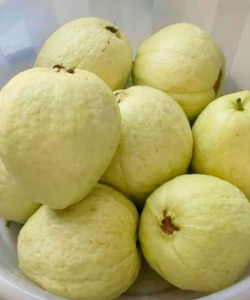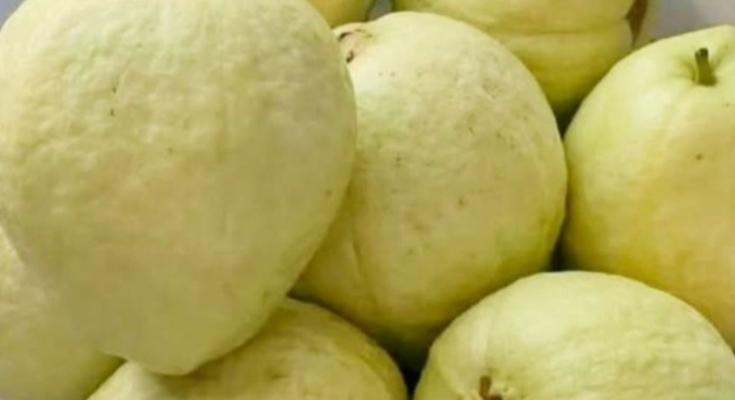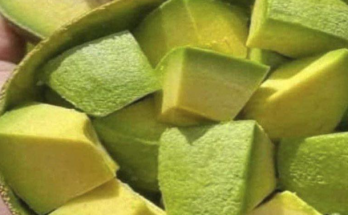
For people living with Diabetes mellitus, making smart food choices is a key part of maintaining healthy blood sugar levels. Fruits can be tricky — some are packed with natural sugars that can cause glucose spikes, while others provide valuable fiber and nutrients that support better control. One tropical fruit that often raises questions is guava.
Guava is sweet, fragrant, and refreshing. But is it safe for people with diabetes? The short answer is yes — when eaten in moderation and prepared correctly, guava can actually be beneficial for managing blood sugar. However, there are also some important precautions to keep in mind.
Let’s explore guava’s nutritional value, how it affects blood sugar, its potential benefits and risks, and how to eat it wisely if you have diabetes.
1. Nutritional Profile of Guava
Guava is rich in vitamins, minerals, and fiber, making it a nutrient-dense fruit.
A typical 100-gram serving of guava (about half of a medium fruit) contains approximately:
-
Calories: 68
-
Carbohydrates: 14 grams
-
Sugars: 8.9 grams
-
Dietary fiber: 5.4 grams
-
Protein: 2.6 grams
-
Vitamin C: More than 200% of the daily recommended intake
-
Glycemic index (GI): 12–24 (low)
That low glycemic index is particularly important for people with diabetes. It means guava causes a slow and steady rise in blood sugar, rather than a sharp spike.
2. How Guava Affects Blood Sugar
Unlike fruits with high GI values (such as watermelon or pineapple), guava is digested slowly thanks to its high fiber content. Fiber acts like a natural “speed bump,” slowing the absorption of sugar into the bloodstream.
In some studies, guava has even been found to improve blood sugar regulation. The fruit’s natural compounds, including antioxidants like vitamin C and polyphenols, help combat oxidative stress — a factor that plays a role in insulin resistance.
Additionally, guava contains moderate levels of natural sugars, but because it’s paired with so much fiber, its impact on glucose levels tends to be milder than many other sweet fruits.
3. Benefits of Guava for People With Diabetes
a. Helps Control Blood Sugar Levels
The high dietary fiber in guava slows sugar absorption and promotes better glycemic control. People who eat moderate amounts of low-GI fruits like guava may have more stable post-meal blood sugar levels.
b. May Improve Insulin Sensitivity
Some research suggests guava leaf extracts can help improve insulin sensitivity. While the fruit itself isn’t a medication, consuming it as part of a balanced diet may support your body’s natural regulation processes.
c. Supports Heart Health
Diabetes often comes with an increased risk of heart disease. Guava’s potassium, antioxidants, and soluble fiber can help lower blood pressure and support healthier cholesterol levels — both of which benefit cardiovascular health.
d. Aids Digestion and Weight Management
Fiber not only stabilizes blood sugar but also promotes a healthy gut. Because guava is filling yet low in calories, it can help with weight control — another important factor in managing type 2 diabetes.
e. Strengthens Immunity
Vitamin C plays a key role in immune defense. Since guava is extremely rich in this vitamin, eating it regularly can help boost overall health and protect against infections, which can be more serious in people with diabetes.
4. Risks and Precautions
While guava has clear benefits, it’s still important to consume it in moderation. Here are a few potential concerns:
a. Portion Size Matters
Eating too much guava at once can still raise blood sugar levels, especially if the fruit is very ripe (ripe guavas are sweeter and contain more sugar). One medium guava per serving is usually a sensible amount.
b. Watch Out for Added Sugar
Guava products like juices, jams, or candied guava are often loaded with added sugar, which can spike blood sugar levels quickly. For people with diabetes, fresh whole guava is the best option.
c. Overeating Can Cause Digestive Discomfort
Guava is rich in fiber, which is great in moderate amounts. But eating too much may lead to bloating, gas, or stomach cramps.
d. Guava Leaves vs. Fruit
Guava leaf extracts are sometimes marketed as natural supplements for blood sugar control. While some studies suggest potential benefits, they should not replace prescribed diabetes treatments. Always consult your doctor before trying any supplement.
5. Best Ways to Eat Guava for Diabetes
✅ Eat It Whole (With the Skin)
The skin of guava contains additional fiber, which further slows sugar absorption. Just make sure to wash it thoroughly before eating.
✅ Eat It Slightly Unripe
Slightly unripe guavas tend to have lower sugar content compared to fully ripe ones. They’re a bit firmer and less sweet but offer more controlled glucose impact.
✅ Pair It With Protein or Healthy Fat
Combining guava with protein (like yogurt, cheese, or nuts) or healthy fat (like avocado or seeds) can slow sugar absorption even more, resulting in steadier blood sugar levels.
✅ Control Your Portion
Stick to about one medium guava or half of a large one per serving. This provides enough nutrients without overwhelming your system with natural sugars.
✅ Avoid Juicing
Juicing removes the fiber and concentrates the sugar, which can lead to blood sugar spikes. Eating the fruit whole is much healthier.
✅ Make It a Snack, Not a Meal
Guava works best as a balanced snack between meals rather than a main source of calories.
6. Creative and Healthy Ways to Enjoy Guava
-
Fresh slices with yogurt — for added protein and creaminess.
-
Guava salad — mix guava with cucumber, mint, and lemon juice for a refreshing, low-sugar dish.
-
Guava smoothie (fiber intact) — blend with spinach, chia seeds, and unsweetened almond milk (don’t strain).
-
Chopped guava in oatmeal — adds natural sweetness without refined sugar.
-
Guava with nuts — the healthy fats from nuts help balance blood sugar.
7. Scientific Evidence and Research
Several studies have explored the relationship between guava and blood sugar control:
-
A study published in the Indian Journal of Medical Research found that consuming guava without the peel significantly lowered post-meal blood sugar in people with diabetes.
-
Another study suggested guava leaf tea might improve blood glucose levels and lipid profiles in people with type 2 diabetes.
-
Animal studies indicate guava compounds may have antioxidant and anti-inflammatory effects, which can support insulin function.
These findings don’t make guava a cure, but they reinforce that it can be a diabetes-friendly fruit when consumed mindfully.
8. Who Should Be Cautious
While most people with diabetes can safely enjoy guava, certain individuals should be more careful:
-
Those with very tight blood sugar control goals — even natural sugar can affect levels.
-
People on insulin or other medications that increase the risk of hypoglycemia — adding fruit may require adjustments.
-
Individuals with digestive sensitivities — high fiber can cause discomfort in some people.
If you have concerns, it’s best to speak with your healthcare provider or a registered dietitian before making big changes to your diet.
9. A Comparison With Other Fruits
| Fruit | Glycemic Index | Fiber (per 100g) | Sugar (per 100g) | Diabetes-Friendly |
|---|---|---|---|---|
| Guava | 12–24 | 5.4 g | 8.9 g | ✅ Yes (best eaten whole) |
| Banana (ripe) | 51 | 2.6 g | 12 g | ⚠️ Moderate |
| Mango | 51 | 1.6 g | 14 g | ⚠️ Limited |
| Apple | 36 | 2.4 g | 10 g | ✅ Good |
| Grapes | 46 | 0.9 g | 16 g | ⚠️ Portion control needed |
Guava’s low GI and high fiber make it one of the better fruit choices for people managing diabetes.
10. Key Takeaways
-
Yes, guava can be good for people with diabetes — its low GI, high fiber, and rich nutrients support stable blood sugar.
-
Moderation is essential. One serving per snack or meal is ideal.
-
Choose slightly unripe, fresh guavas and eat them with the peel for maximum benefit.
-
Avoid guava juice, jams, or other processed forms with added sugar.
-
Pairing guava with protein or healthy fat helps keep blood glucose levels balanced.
-
As with any dietary change, consult your doctor or dietitian if you’re managing diabetes.
Final Thought
Guava is often called a “superfruit” — and for people living with diabetes, it can be a smart, satisfying, and health-supporting snack. Its natural sweetness comes with a package of fiber, vitamins, and antioxidants that work in your favor rather than against you.
When eaten the right way and in the right amounts, guava doesn’t just fit into a diabetes-friendly diet — it can enhance it. So next time you’re craving something sweet, skip the sugary desserts and reach for a crisp, fresh guava.
Your taste buds — and your blood sugar — will thank you.




